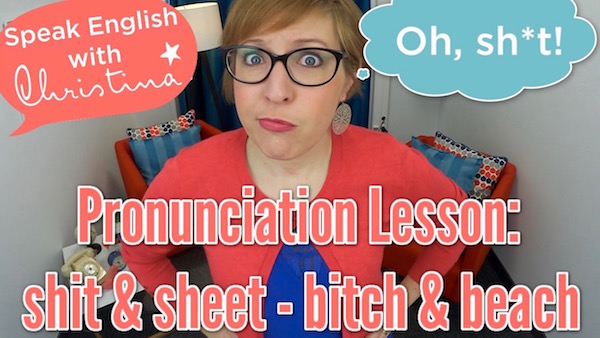
Hey there, and welcome to Speak English with Christina, where you’ll have fun becoming fluent in American English. I’m your English coach Christina, and today…. And today that introduction was maybe a little harder to understand than usual, don’t you think (watch the video, you’ll hear it’s fast!)
“Don’t you think?” Or in real spoken English, it sounds like /dontchuhtheen’/
Mmmm. Americans don’t articulate. They sound like they have a hot potato in their mouth. And that makes it difficult to understand Americans when they speak.
So today’s episode you’ll learn how to understand fast spoken english. Let’s go!
UNDERSTAND REDUCTIONS IN ENGLISH SPEAKING
Americans reduce a lot of sounds when they speak. For example, you read “Don’t you want to get a coffee later?”
Then we squish it all together when we speak, and it becomes /Duhwntchuh wanna gedduh coffee layder?/ We reduce “don’t you” to /duhwntchuh/, “want to” becomes /wanna/ and “get a” becomes /gedduh/.
You have to notice these to start understanding real English. To help you, I created an American Accent Survival Kit that gives you audio exercises for 12 everyday expressions. Go get it! Seriously. And it’s free!
DON’T DEPEND ON SLOW ENGLISH
If you want to understand the way Americans really speak, you have to listen to real spoken English. A lot of books to study English give you audio that is slow, or clearly articulated. In the real world, it’s not like that. I’m sure you’ve noticed!
So you need to also study English the way it’s really spoken. My video series “Tame The Hot Potato” helps you do that. For each video, you can get a worksheet to help you understand our everyday conversations in real spoken English.
KEEP ON PRACTICING YOUR ENGLISH
How many of you depend on television series and movies to improve your English comprehension? I know you do. TV is good, and fun, but it’s not enough. You have to consciously work. Study. Do listening exercises.
The site elllo.org is one of my favorites for this, plus you can watch this video for an idea on how to use the site to improve your listening skills. And there’s also this lesson and this lesson where you can do some exercises.
PRACTICE THE “AUDIO FLOOD”
If you’re thinking “Christina, I don’t even understand ‘audio flood’!”, let me explain. A flood is like when it rains a lot, a lot, a lot, and there’s a lot of water everywhere. In the streets, the houses. That’s a flood.
You have to flood your brain with audio in English. This is where movies and TV series are useful. You can also listen to American radio stations with the smartphone app TuneIn Radio.
Or listen to podcasts in English. My favorite for learning English is All Ears English, because it’s English lessons, but in real spoken English. My favorite podcast just for listening is the Tim Ferriss Show, which is about optimizing your performance in general, including learning languages.
PRACTICE YOUR ACTIVE VS PASSIVE LISTENING
You see, there’s a difference between active and passive listening. And you need both. Most students have too much passive listening *TV, ahem… movies, ahem…* and that’s why their comprehension improves slowly.
You have learned a few activities earlier, and here’s one more active listening activities that will boost your comprehension AND your pronunciation:
Shadow reading. Here’s how you do shadow reading.
1. Get the transcript of the audio you listen to. For example, on elllo. You have the transcript of each audio on the site.
2. As you listen, you read with the speaker. Not listen and repeat. You match the speaker’s speed, intonation, everything.
It’s that simple! This makes you more conscious of how the words sound when they’re spoken at normal “American” speed.
LAUGH AT YOUR MISTAKES
You’re going to misunderstand things. Even we native speakers misunderstand things, like that famous Jimi Hendrix song “Scuse me while I kiss ?????” this guy? Oh ok! Or “the sky”? Hmm. This guy? Or the sky? This guy, the sky. This guy, the sky.
Or me in French, when, one time, Romain and I were listening to Lady Gaga (don’t laugh!), and Romain tells me in French “Jean-Paul a des CDs de ça dans sa voiture” Jean-Paul has CDs of this in his car.
Only the French expression for “some CDs”– “des CDs”–sounds a lot like “décédé”–died. So, for 3 seconds I was totally shocked because I understood that our friend Jean-Paul had died in his car from listening to too much Lady Gaga. It’s better to just laugh at yourself if you can.
And for those times when you really need to understand, watch these 2 lessons: “How to stop feeling embarrassed when you don’t understand” and “Reformulating to be sure you understand.”
They were my 1st 2 video lessons. Feel free to laugh at the quality. It’s pretty bad, but the lessons and the content are good.
Now, what about you?
How do you improve your listening comprehension skills?
Share your tips with the other Speak English Ambassadors, because you surely have some great ideas!
Be sure to get my American Accent Survival Kit to help you actively improve your listening comprehension.
OK Ambassadors, thanks for watching and I’ll see you next week!
Have fun,
Christina

More English lessons...
Click the image to see the lesson









Excellent!!!!
Thanks so much Na-Rae! Good to see you back here!
https:/blog/resources-for-listening-practice/#comment-64655
I like to listen music by paying attention to every phase the singer says. Then I look at the some Lyrics Site the correct transcription to see that I understood.
Givanildo
Singing is a great way to get your mouth around saying the words too! And it can be fun when you understand the lyrics of your favorite songs in English!
For the site, do you mean the site lyricstraining.com, or just sites with song lyrics in general? Your suggestions for resources could be very helpful for the community if you’d like to share them with us!
Thanks!
The site song Lyrics that I used to visit is Vagalume.com . It is much praticle and has some games to complete the lyrics for people who want to learn English.
Visit it and good luck.
Have fun.
Givanildo
Thanks so much for sharing the name of the site. I haven’t heard of that one, so I’m going to check it out now! Thanks, from me and from the Speak English Community!
Excellent
Thank you so much for your recomendation dear Christina, I follow yo and I so excited to learn with you.
A good place for practice is http://www.youglish.com
Regards,
Jose
Hi Jose! I’m excited that you’re excited to learn English! Keep up your motivation!
And thanks for sharing that link! I’m sure the Speak English Community will love it!
All the best,
Christina
Thank you so much Christina. Your tips are invaluable, and , I must say, it´s fun too!!!
Thanks so much Gabriela, that’s exactly my aim: fun AND invaluable tips!
Poor Jean-Paul !! Still laughing out loud behind my computer.
Thank you Christina ! 😉
Hahaha! Great, if it made you laugh! That’s the goal (that, and helping you improve your English, of course 😉
Glad to leave you a short comment..
Thank for all, for this energy and this opportunity you give us. You are making all french native speakers better.
I follow all your lessons and just need some means to buy your book “What the Faute”
I am fairly good at speaking but I get many difficulties at listening.
I’ve some american friends but I cannot speak like them. We met breaks and interruptions in our conversations..
I still manage in learning, improving my level whatever the mistakes I do.
Thank for your advices
Olivier
Hi Christina,
My name is Anna. I living in London. I just arrived here for 6 months ago. I really interested your video. But I am really curious that why I couldn’t understand to the people who’s talk with me over the phone. I always lost a job cos I couldn’t under what are they about? Actually, I can communication very well of face to face. Can you recommend me?
Chisty, Hope that is gonna help me
I hope so too!
Dear Christina, This content is very informative and knowledgeable for us because of your content is related to “6 Secrets to Understand Fast-talking Americans” your Blog is informative with us keep do and give more information related to this content .
Thanks for information
keep posting
Thanks so much for the encouragement, Martin! And I’ll definitely keep posting! 1 blog post per week for the past 5 years, and I don’t plan on stopping any time soon!
nice post
Thank you so much!